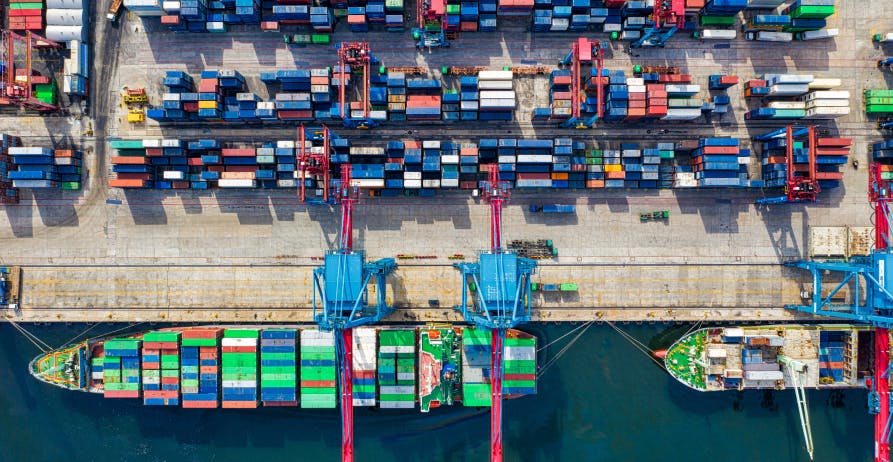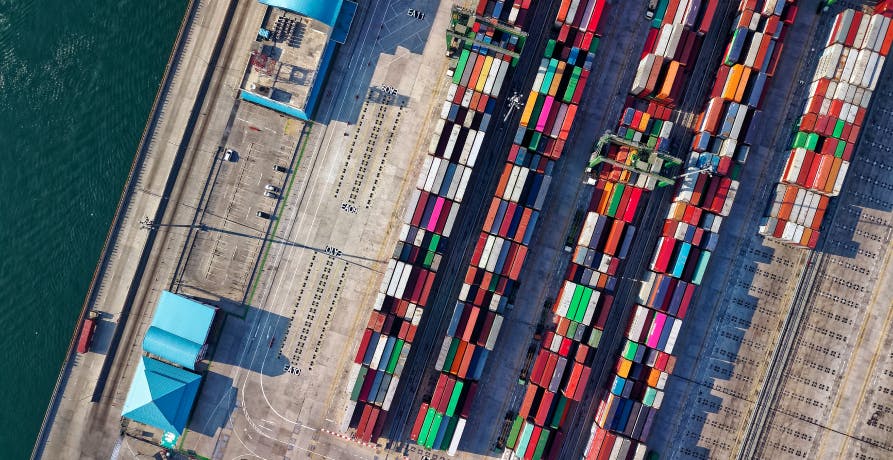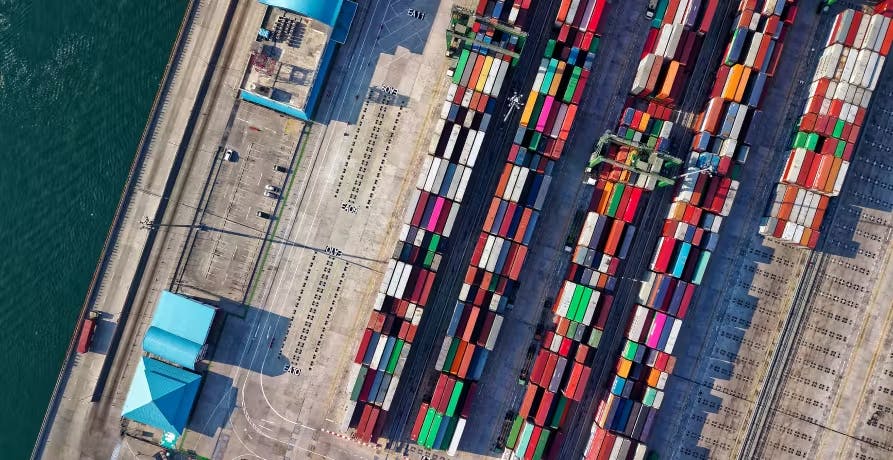ESG / CSR
Industries
Why Does Supply Chain Visibility Matter for Sustainability?



Creating a company with a good reputation and viable sustainability can be accomplished in a variety of ways, but supply chain visibility remains essential for those who want to maintain their newfound sustainable business.
Your company's supply chain is one of the most imperative elements to overall business success – as it allows for a continuous flow of resources and to ensure that people have regular access to products and services.
In this article, we'll review what a supply chain is, why the visibility of your supply chain is important, and how it can help your company to be more sustainable.
What is a supply chain?
A supply chain is the network of various companies and individuals who take part in the creation or manufacturing of a product – such as providing raw materials or being involved in one of the steps of the creation of the product itself.
Supply chains often begin with the companies that provide the raw materials and end at the method of transportation used to deliver the product to its final destination – such as a delivery truck. The supply chain of a company serves as the base for the creation and sales of all products, as the manufacturing and selling of their services and goods would be impossible without raw materials, production facilities, or transportation for delivery such as cargo freight via plane or truck.
💡 However, a supply chain can consist of warehouses, retailers, and vendors as well. In short, any place that a product ends up before it falls in the final hands of the customer – can be considered to be a part of the supply chain.
Supply chain management is imperative for any business: as it can help to reduce business costs, improve sustainability and production efficiency, and maintain loyal customers as well as attract new investors that can help the business grow.
👉 A well functioning supply chain is important for any business seeking to adhere to sustainable guidelines, meaning that supply chain visibility is also imperative to success in sustainability.


What is supply chain visibility?
Supply chain visibility is the effort made to monitor the various goods, products, and services being supplied to a company or currently in production as an attempt to clarify the sustainability and eco-friendliness of the activities executed by each member in the supply chain.
Through improved supply chain visibility, a supply chain can become more effective, sustainable, and ultimately help the environment and business in question.
👉 However, the ultimate goal of supply chain visibility is for businesses to better understand how their supply chains work in order to reduce business risks, acquire improved knowledge and data, and to improve the efficiency and eco-friendliness of their supply chains to the greatest extent possible.


Why is visibility important in supply chains?
Supply chains may seem like the accompanying pianist at the show, lacking the same spotlight as the star singer – but they just have an important, if not more imperative, role in the overall emissions emitted by a company.
Seeking to improve supply chain visibility means a company must closely monitor their scope 3 emissions. Scope 3 emissions, unlike scope 1 emissions or scope 2 emissions, are known to be the most difficult to measure – as they account for all other emissions created outside the premises of the companies operations, such as emissions created from business travel, what happens to products after they are sold, or activities executed throughout various supply chains the company has chosen to work with.
Usually, the emissions created in scope 3 emissions, or supply chain emissions, are up to five times the amount of the emissions created from scope 1 emissions and scope 2 emissions combined.
💡 Scope 3 emissions, usually created on behalf of a company's suppliers – is imperative for any organization seeking to become more sustainable.
Just like the colloquial saying that, “you are the sum of the five people you spend the most time around” – businesses and their efforts towards sustainability are constricted by the suppliers that they choose and how well they manage supply chain visibility.
It is impossible to become a sustainable company without knowing how every facet and behind-the-scenes operation is functioning – in other words, a company's suppliers.
👉 Therefore, companies dedicated to improving their sustainability must seek to improve their supply chain visibility if they want to be able to brand themselves as a sustainable or green company. In order to become a green company, understanding how your suppliers source their materials is essential in order to brand yourself as a sustainable company.


Is supply chain visibility good for overall business?
Seeking to improve supply chain visibility isn’t just the right move for the environment, but for any company seeking to find commercial success for their business. This is because customers are becoming more aware of the importance of sustainability and want to purchase environmentally friendly products.
💡 Think of supply chain visibility like the ingredients for a recipe. If the ingredients aren’t well-sourced, or fresh – it’s next to impossible to create a true farm-to-table experience for the customers of a restaurant. The same goes for any company seeking to sell eco-friendly products or become more sustainable as a whole.
Improving supply chain visibility can also help to manage potential disruptions, as a supply chain dedicated to providing consistent data analysis can provide the business with the foresight to prevent potential mishaps. Supply chain visibility can also help companies to become more efficient and agile, as supply chain visibility helps to increase transparency and therefore – improves the chances of immediate decision making necessary to maintain productivity.
👉 As a result of this, supply chain visibility can help to improve efficiency, satisfy customer demands, curb inflation, and influence the use of data throughout the supply chain and the rest of the company for better educated and numerical business decisions.
The best part about supply chain visibility, is that continued efforts to improve supply chain visibility will benefit the supply chain and business as a whole. There are clearly many benefits to ameliorating supply chain visibility – but how easy is it to do so?


What are the challenges which could affect supply chain visibility?
It can be difficult to improve supply chain visibility at first, but doing so can help to prevent difficulties with supply chain management in the future. There are a few challenges that come along with trying to improve supply chain visibility, which include deforestation, air pollution, EHS health and safety, and more economic and environmental parameters.
Another challenge of improving supply chain visibility is the fact that a company cannot be held accountable for every single action of each part of the supply chain.
For example, a brewery company cannot control if there is a shortage of carbon dioxide – which later impacts bars or restaurants that want to be supplied with beer to sell at their individual businesses. It is important for businesses to monitor the current status of each component in their supply chain – but it’s next to impossible to prevent inevitable mishaps such as the recent carbon dioxide shortage breweries experienced last summer. In order to improve supply chain visibility – it is beneficial to monitor these circumstances before they get out of hand.
Lastly, a challenge of improving supply chain visibility is lacking the ability to thoroughly decipher all of the data provided by a businesses supply chain. Data is good, but without the knowledge of evaluating what those numerical figures mean for future business decisions and risk management – it can prove difficult to improve supply chain visibility.
👉 The challenges associated with supply chain visibility are inevitable, but despite these potential roadblocks – improving supply chain visibility is well worth it as it can provide businesses with a steady foundation to work towards greater sustainability.


How can businesses improve upon supply chain visibility?
While improving supply chain visibility can be challenging – the good news is that there are a lot of ways that companies can go about achieving greater supply chain visibility.
Here are just a few of the ways companies can go about increasing the awareness of their supply chain visibility.
Hire open-minded people
Whenever a business is capable of being a part of the recruitment process for employees, it can prove beneficial to hire flexible employees that are open-minded and support the concept of sustainability. The say, “team work makes the dream work” – and the same goes for improving supply chain visibility. The more people on the team dedicated to supply chain visibility, the better results the company will see.
Acquire technology to help
No one has eyes in the back of their head – meaning it’s not feasible to know what each part of your supply chain is up to all of the time. The best way to combat this issue is to recruit the help of technology to help with timely reports and updates through your supply chain.
Consider tier suppliers
Tier suppliers can help companies to organize which parts of their supply chain are most important by ranking their suppliers into tier 1, tier 2, and tier 3 suppliers. This can help to improve communication amongst the more important suppliers for a business and improve efficiency and better end-quality of the products to be sold.
Supply tiering can also help to improve the relationship between suppliers and businesses and reduce the risk of back-ordered products or delivery delays. Tier 1 suppliers, specifically, will be greatly encouraged to improve the quality of their role in the supply chain due to their newfound ranking – which is excellent for improving supply chain visibility.
Manage workflow
This tip goes back to the advice about hiring open-minded employees – as good workflow isn’t possible without a competent team. Ept employees can help to improve supply chain visibility with their consistent awareness towards what changes in each department should be made in order to improve both efficiency and productivity. This improved management of workflow can ultimately help to improve supply chain visibility as well.
Overall, all of these tips to improve supply chain visibility all have one thing in common: increasing awareness of individual actions in order to better the entire supply chain and its overall success and functionality. The more a business grows, the more their supply chain will – meaning supply chain visibility will only become more difficult to manage with time. Our advice? Don’t wait to take control of your supply chain’s visibility – start today with our help in carbon accounting.
What about Greenly?
If reading this article about the importance of supply chain visibility for companies seeking to become more sustainable has made you interested in reducing your carbon emissions to further fight against climate change – Greenly can help you!
At Greenly we can help you to assess your company’s carbon footprint, and then give you the tools you need to cut down on emissions. We offer a free demo for you to better understand our platform and all that it has to offer – including assistance with boosting supplier engagement, personalized assistance, and new ways to involve your employees.
Click here to learn more about Greenly and how we can help you reduce your carbon footprint.



